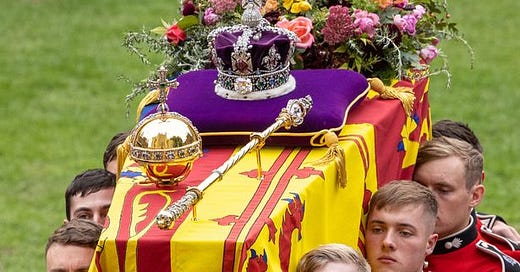It appeared unapologetic and unrestrained. The world seemed to stand still. For a full ten days after the death of Elizabeth II, traditional Britain, or at least something approximating it, came back to life.
Public grief captivated the populous, and so did the ceremony and sense of occasion that followed. People were glued to their devices to see Charles III address the nation the day after his mother’s passing. Floral displays across the country attested to the bond between the British and the late Queen.
The period of national mourning was dignified. Instead of profuse emoting, hysterics, and the purchase of Elton John records as occurred following the death of Princess Dianna in 1997, respectful sombreness and a weighty sadness characterised the mood. The event hit many like a ton of bricks. Although Elizabeth II was ninety-six, she had just greeted the new Prime Minister. She looked frail but not at death's door. The end of the Elizabethan age came with a genuine sense of shock, rendering its impact more profound.
Vox-pops laid bare fraught tones, sad reflections, and tears some could not fight back. For the most part, reactions were not disingenuous or in bad taste, and the tears were not hysterical or self-aggrandising.
A queue to see Elizabeth II lying in state at Westminster attracted not just people living on the British mainland but also those of British descent from across the Anglosphere. Some came from other Commonwealth countries too. The queue became known as ‘‘the queue’’. Waiting times reached over twenty-four hours. It was a pilgrimage.
As the days rolled by and the line kept growing, infamous comments from former Channel 4 presenter Jon Snow came to my mind. On 29 March 2019, several Brexit rallies took place around Westminster. Snow reported on the events and said the following with a sense of disgust and annoyance: “It has been the most extraordinary day. A day which has seen – I’ve never seen so many white people in one place. It’s an extraordinary story. There are people everywhere. There are crowds everywhere.” Like the 2019 Brexit rallies, the queue revealed an almost entirely white convergence; this is why I found his comments so evocative. I imagined him looking at these crowds and savoured the schadenfreude.
The 2011 Census revealed white Britons to be a minority in the capital. Over the last decade, it has increased in diversity and is often referred to as a global city. When viewing the masses standing in line it was easy to feel like one had ventured into a time machine to the Britain of twenty or twenty-five years ago. The queue was not global. The cultural incoherence reflecting London today gave way. We saw a recrudescence of a people now fading fast from the streets they once defined.
Thankfully, the left-liberals who so readily cask askance glances at any hint of white ethnic homogeneity were largely anonymous during what became a period of national togetherness. In the vulgar sphere of social media, the usual suspects made their hatred of Elizabeth II, Britain, and whites clear. This venom and vitriol did not preoccupy most of us and failed to dominate the headlines and our public life. The malevolent were repelled and relegated. For a short time, there was a refreshing absence of the kind of diversity we are told to give way for. The historically illiterate, who deny the perceived ills of everyone except the British, were mainly kept away. We were without compulsive wavers of rainbow flags, knee-takers, and those who wail about this or that profession being too white. We saw a rejuvenation of a Britain some might have thought dead and buried. Many may have felt that London was home for the first time in a while.
When asked why they had come to say goodbye to Britain’s longest reigning monarch, some said they were proud of their nation and people. This was not questioned or debated by reporters but accepted. That which is so readily the subject of gainsaying and attempts at deconstruction was permitted. At this moment it was OK to be British. It was OK to be English. It was OK to be us.
What a welcome change it was. The period of national mourning allowed order and unity. Britain felt more like Britain. We returned to a world we had lost.
References
Ofcom clears Channel 4 News over Jon Snow's 'never seen so many white people' comment - Press Gazette




